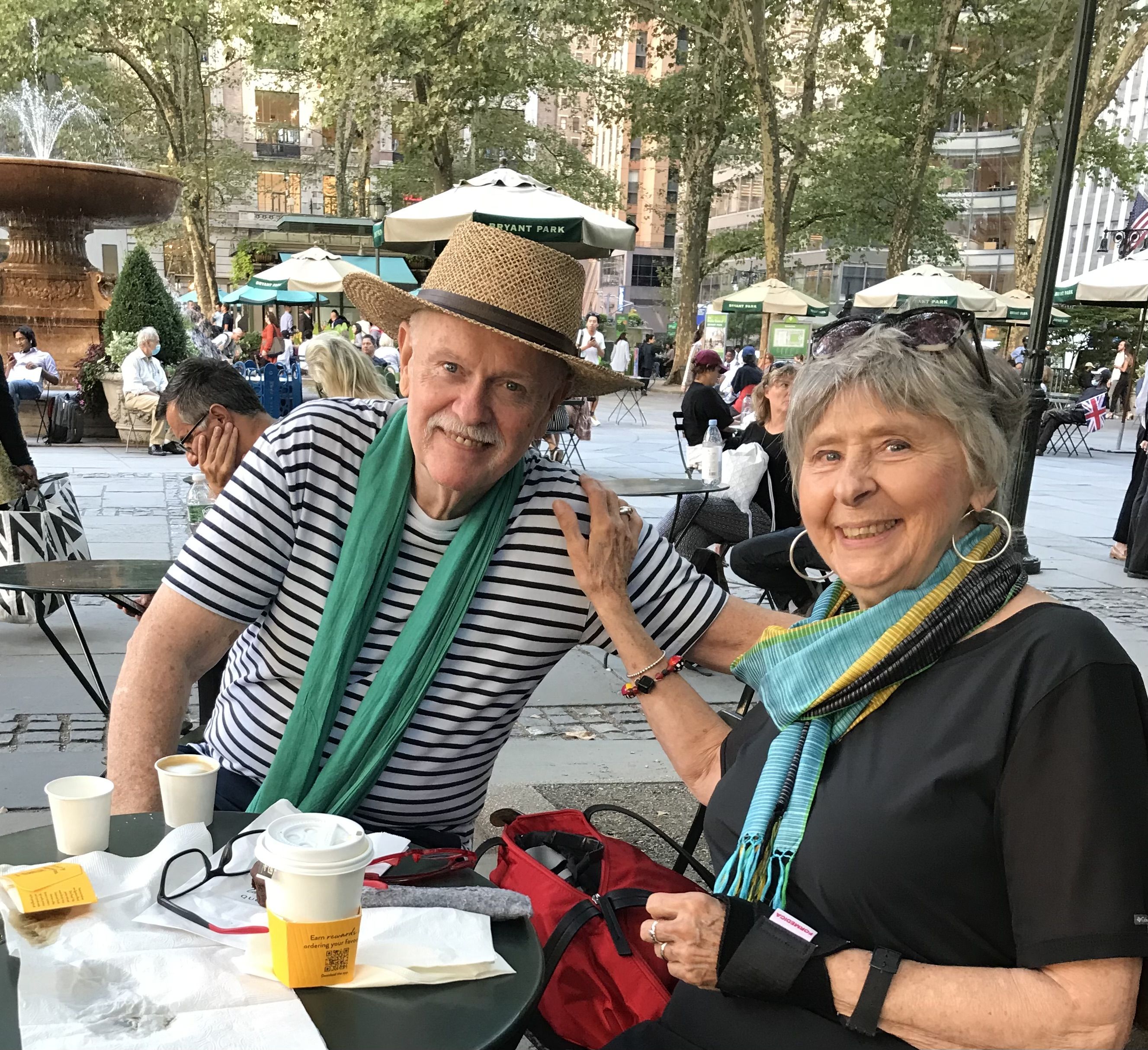“We all tend to see our participation as the train’s first stop.” So says James F. Olwell in “The Art of Being Irish in Hell’s Kitchen.”
The Bronx-born activist and writer will recount the story of Irish Arts Center’s actual first stop when his book is launched there on Saturday afternoon, Dec. 7. And he’ll mention his own next stop: Quebec in 1979.
“But before I left for Montreal, I did something important in Manhattan,” he told the Echo.
Audience members will be particularly interested to hear about it, as the book’s subtitle is, “A Memoir of the Organizing of the Irish Arts Center in New York City, 1972-78.’’
IAC’s current leaders will likely agree with Olwell, who was instrumental in acquiring its original building in late 1974, that “an organization needs to know whence it came and what it was like then.”

Olwell was born in 1946 to Irish-American parents. His father was a trial lawyer for the City of New York, while his mother was a “housewife par excellence” and a “fervent Catholic devoted to the poor.” After studying sociology at Iona College, he spent a year with the VISTA program in Chicago. Swept up by the radicalism of the times, Olwell was searching for his own role, and found it thanks to meeting with Brian Heron, a grandson of labor icon and 1916 Rising leader James Connolly. Heron would become Irish Arts Center’s first director and a close ally and friend.
“Often, people do not see the Irish Arts Center as a process of community organizing, but it was. Once it didn’t exist, and then it did,” Olwell said. “Then it did, but stalled. Finally, it succeeded and prospered, perhaps beyond our greatest expectations.”
He recalled his next important chapter: “I moved to Montreal for the love of Simonne Lavoie, whom I had met at An Claidheamh Soluis/the Irish Arts Center. We had two children, Oisin Etienne, now 44 and Marjolaine Sarah, 38.”
Working in the Quebec Health Care Network over many years, Olwell helped citizens create organizations to provide services they needed, for instance: Le Carrefour Jeunesse Emploi de NDG (the NDG Youth Employment Crossroads), Femmes averties/Women Aware (Abused Women Advocating for Rights and Equality), Black Women on the Rise, Bienvenue a NDG (Welcome to NDG, orienting recent immigrants to Quebec).
“All still exist,” he said. “In 2013, I was chosen as a member of La Société des Grandes Citoyens by the Borough of Cotes des Neiges/Notre Dame de Grace.”
That was the year of Olwell’s retirement, which saw a pivot towards literature, specifically his taking “poetry courses galore.”
James Olwell celebrates with his grandson his 2nd birthday.
His prior published output were six poems that appeared in the Summer 1977 issue of the long defunct Ais-Eiri, the Magazine of the Irish in America. In recent times he published two poetry chapbooks — “Crossings” (2016), printed in a limited, illustrated edition of 65 copies by Iron Rabbit Bindery, Toronto and Montreal; and ‘’Pensions’’ (2019), with Snow Press.
He also co-created two poetry services: The Montreal Interactive Poetry Exchange, a monthly public reading series now in its eighth year and the 2 Susan Poetry Circle, a monthly workshop with 10 poets in its ninth year.
Meantime, the New Yorker’s third book of poetry was put on hold when he decided to write about those six years organizing in the 1970s.
“Political discord disabled the Center’s ability to pay the rent,” Olwell remembered of the very early years, which came after what had been an impressive start – “the Chieftains’ first American visit, covered by the New York Times with a picture, and later, with a series of performances by Geraldine Fitzgerald and others at the Abbey Theatre on West 13th Street.”
He continued, “We then engaged in what Brian called ‘community organizing 101’ and built the Center piece by piece. We started with a weekly seisiún of traditional Irish music, dance and song and an occasional reading of ‘Finnegans Wake’; then free courses in traditional Irish music and dance, Irish language, theatre etc., which continue to this day at the Center; then the acquisition of an abandoned three-story building on West 51st street; followed by the creation of a successful Off Off Broadway theater, the Irish Rebel Theatre, and finally a 150 member-plus volunteer-run, inclusive, supportive membership organization.
“It is the story of young Irish born and Irish Americans and others, wanting to redefine, to learn about and participate in what it meant to be Irish American,” he said of his book. “It is the story of young people walking into their future and their organization with them.”
“The strengths of Olwell’s memoir are striking. He conveys with immediacy his relationships and activities at the Center,” commented a writer in the Ottawa Review of Books. “From extensive research he conducted over the years, he gives the readers a feeling of being there in this important moment in the rising consciousness of an ethnic group. They laid the groundwork well, as the present Irish Arts Center recently finished building a fully funded $60 million state-of-the-art facility to continue to support this community.”
Olwell said Irish Arts Center of today “is resplendent in a beautiful home on 11h avenue,” and the two buildings, the new and the old, “meet and are connected at the back, a surprise gift of the present leadership.”
He added, “Soon, the old Center will be fully renovated and provide space for…I don’t know. You must ask the Director and Vice Chair.”
Olwell retains his enthusiasm for Irish arts. “I do not love only traditional Irish music, glorious as it may be,” he said. “I love Irish literature even more. For it is the gift of going elsewhere without the travel and with a complete story.
“Without needing to bother to mention the names of Wilde, Shaw, Yeats or Joyce, its abundance and brilliance is overwhelming. Different generations shine,” he said. “The genius of our writing as well as the incredible enjoyment of its reading are both insufficiently known by Irish Americans.”
He hopes that Claire Keegan’s novella “Foster” might “break the spell,” for it was adapted into the Academy Award Best Picture-nominated “The Quiet Girl” (“An Cailín Ciúin”). He would like them to know, too, that William Trevor is Ireland’s own Chekhov.
Olwell also admires John Banville, Colm Tóibín, Paul Murray, John Boyne, Sally Rooney and “so many others.” But there are three books recently that he particularly liked: Sebastian Barry’s novel “Days Without End,” “Grace,” a novel by Paul Lynch, and Fintan O’Toole’s “We Don’t Know Ourselves: A Personal History of Modern Ireland Since 1958.”
Meantime, plenty of readers have been admiring and enjoying Olwell’s memoir. Fellow Bronx-born writer and VISTA volunteer Peter Quinn, for one, said its author is “blessed with the Irish gift of storytelling,” and is a “rollicking fine seanchaí whose story is for people interested in the power of cultural renewal and personal commitment to shaping the future rather than accepting it.”
For more details about the Dec. 7 event, go to irishartscenter.org.









